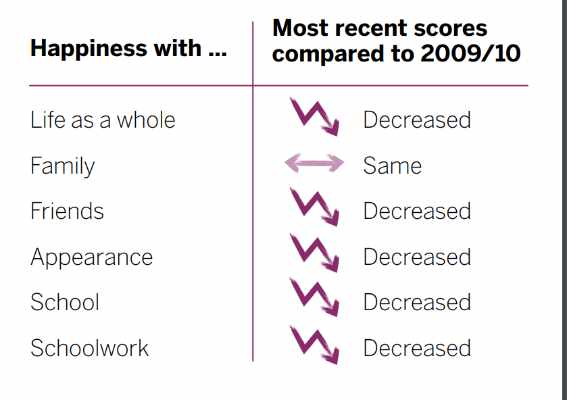Cornwall Schools’ Wellbeing Hub Newsletter 6th Sep 2024
Friday 6th September 2024

Welcome back! We hope you had a good Summer. We wish everyone a safe and successful new term. We look forward to working with you to support the wellbeing of the whole school community.
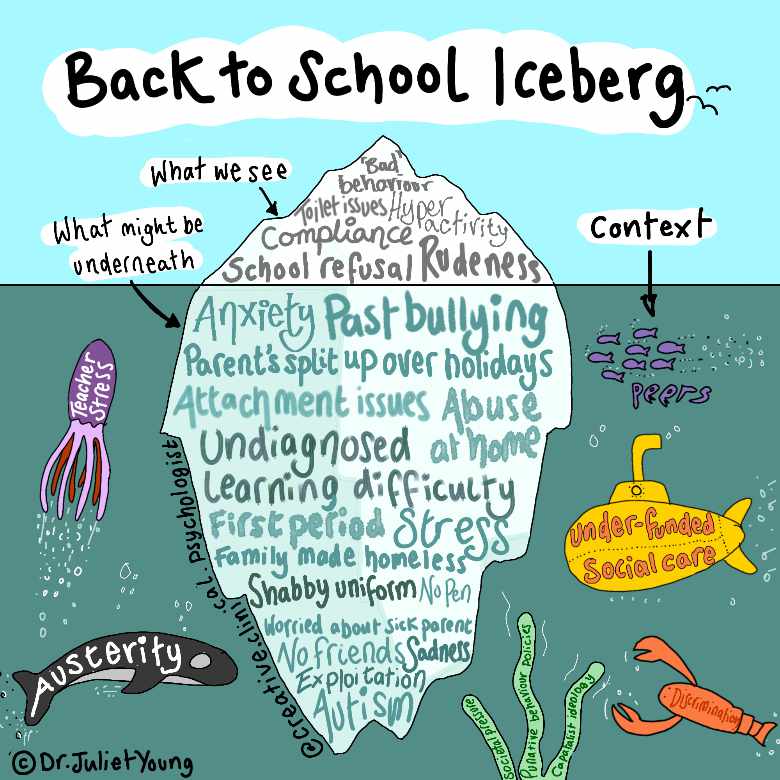
We love this excellent graphic from Juliet Young aka the @creative.clinical.psychologist
For many UK children, they will be returning to the classroom. For some, it will be exciting. For some, it will be a mild disruption to summer of joy. But for some, it will be a bit of an ordeal. They may be hiding a lot under the surface.
Lots of children will have had a stressful or frightening time, and have to readjust to lots of expectations, different cultural norms e.g. eating habits, and peers who have had a better time. Some of them will be processing trauma, and some will still be going home every night to trauma, abuse, and instability.
So whether you're a parent of a child who comes from a loving home, but your child seems to be misbehaving, or whether you're a teacher juggling a hundred tasks, and maybe you’re own difficult stuff at home. I ask you to try and hold some curiosity for what is going on under the surface.
If we can understand or hold curiosity that what we see may be underpinned with pain, then we can feel more compassion. If we can feel compassion, we can usually respond in a way that makes situations easier.
Protective Behaviours Training: Helping Children & Young People Feel Safe
A 2 Day Foundation Course
Safety and helping children and young people feel safe is at the heart of belonging and wellbeing in school – helping to support attendance and attainment. Protective Behaviours can help schools create a physical and emotional safe place where connection and relationships can flourish.
The FREE 2 Day Protective Behaviours Foundation Course is suitable for anyone who lives and/or works with children & young people.
The Foundation Course introduces the 5 elements of the PB process and provides opportunities to experience the 7 strategies in action.
- Day 1 will unfold the PBs Process
- Day 2 will focus on how PBs in the context of a WSA to wellbeing and can be applied in your work / settings
Previous courses have been highly regarded by those attending and everyone has reported finding them relevant and useful to their settings.
“The course was fantastic, thought provoking & the content was ace …great at personalising to settings we had come from. I am full of ideas and want to share with colleagues”
“I found the concept of feeling safe vs being safe and the language of safety really useful. I will teach CYP about EWS and create personal networks”
Delegates on PBs training
There are six courses planned for 2024 / 2025 in locations across Cornwall
This term we have two courses:
- Friday 20th September 2024 / Friday 27th September 2024
- Time: 09:30 to 16:30 each day
- Venue: Carn Brea Leisure Centre, Station Road, Pool, Redruth, TR15 3QS
- Friday 15th September 2024 / Friday 22nd September 2024
- Time: 09:30 to 16:30 each day
- Venue: Chy Trevail, Beacon Technology Park, Bodmin, PL31 2FR
News / Resources / Links
Dr Tina Rae FREE webinar
Supporting those with Emotionally Based School Avoidance (EBSA) - Monday 30th September 4.00. Register for free
Wellbeing Book Club – Reviews
There have been some absolutely super books released over the summer. There are two we’ve especially been waiting for and they were well worth the wait.
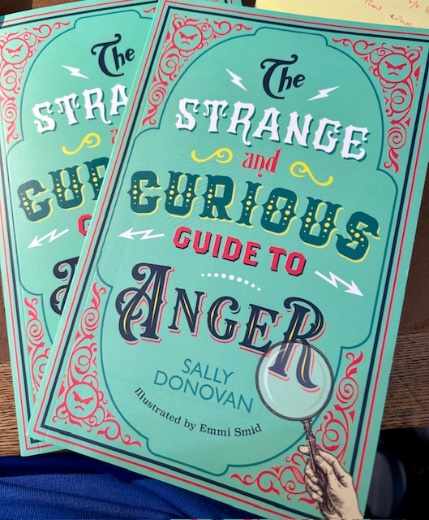 The Strange and Curious Guide to Anger by Sally Donovan
The Strange and Curious Guide to Anger by Sally Donovan
We absolutely loved Sally’s previous book The Strange and Curious Guide to Trauma and the thought of another in the series was exciting (mixed with a little trepidation that it couldn’t possibly be as powerful as the first). It is. The book is simply brilliant – funny / moving / full of wonderful new words and imagery… ‘Rude aspirins’, ‘Badvice’, ‘Gold Standard Humaning’. ‘Some People’ are back along with Ordinary Jo and Tony, the Disco Dancing Baboon. Emmi Smid’s excellent illustrations bring it all to life (love her depiction of anger).
“Yes, but what about the content?” I hear you cry… It is the best way of helping children and young people understand anger. It normalises our feelings and gently explores why we get angry (including its links to not feeling safe in the moment or in the past) and why it is OK to be angry but not OK to hurt people / things. Sally introduces embarrassment / shame and guilt and explains with such clarity and compassion that I imagine many children will feel better about themselves just by that alone. I am in awe of how much Sally can include – neuroscience / emotional literacy / coping strategies / restorative approaches as well as a terrific story about Ordinary Jo and his Furious Friday. This book would make a brilliant read for parents and children / small groups of YP and their support staff / whole classes as part of Social and Emotional Learning in PSHE. It could be read aloud and followed with activities to explore the brain science / using body signs to recognise when we might be feeling angry and strategies to understand why /what we can do about it.
I can’t recommend this book highly enough.
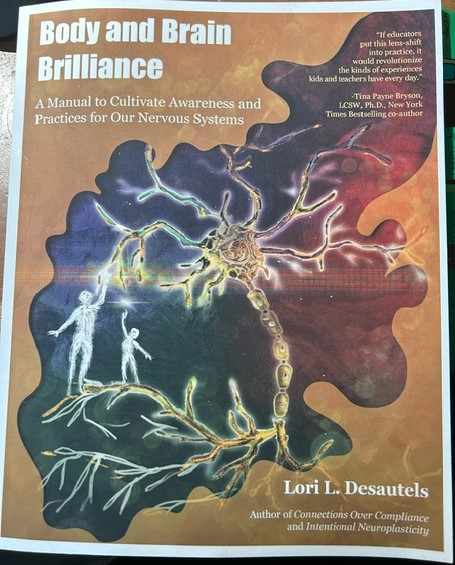 Body and Brain Brilliance by Dr Lori Desautels
Body and Brain Brilliance by Dr Lori Desautels
This is a towering achievement from Lori Desautels, a professor of educational neuroscience and classroom teacher. It is a manual / resource book for social and emotional learning in the classroom based on the brain / nervous system and the power of helping us all to understand both better so as to regulate / co-regulate and bring relational approaches to our understanding of behaviour.
It written with compassion and insight with sections for primary / secondary children and is jam packed with activities and resources (including a huge bank of additional resources available online to support the activities)
I am on my second reading and finding more and more to inform my knowledge and understanding as many, many things I am keen to share with schools.
Perfect for wellbeing practitioners, school mental health leads, behaviour teams. Every school / setting could benefit from having a copy and incorporating it into social and emotional learning and PSHE.
Very Highly Recommended.
The Good Childhood Report
The Children’s Society has published its annual report on the wellbeing of children and young people in the UK. The report looks at trends in the subjective wellbeing of 10- to 15-year-olds from a 2021/2022 survey Findings show: in 2021/22, girls were significantly less happy on average than boys with their life as a whole; and in 2024, 11% of children and young people who took part in the survey had low wellbeing.
Read the report: The good childhood report 2024
Self-Care September from Action for Happiness
Check out the latest wellbeing calendar
Useful transition resources as children settle into their new classes / schools.
Anna Freud
- Supporting children's transition to secondary school: guidance for parents and carers
- Moving up! The transition to secondary school
- School attendance and mental wellbeing
Barnardo’s Education Community
A range of booklets to support you in facilitating conversations with children and young people around mental health and wellbeing:
- The Change Challenge for child aged 5 - 11
- Back to School workbooks for Primary and Secondary
- Stepping into Secondary School
- Therapeutic Games and Activities
- My Coping Toolbox (for primary)
- Emotional Wellbeing Packs (primary & secondary)
- And more…
Anna Freud Schools in Mind – New tools to support wellbeing in schools
Support pupils to manage their mental wellbeing with a whole-school or college approach to mental health.
Our resource hub signposts tools to support you to embed this approach to mental health. We’ve just updated it with new resources to help you develop a mentally healthy school or college this academic year.
Including targeted support in this approach can improve attendance, behaviour and engagement in learning. Use our targeted support tool to find the right evidence-based support options for your setting.
Use our new resources and targeted support toolkit to develop your setting’s offer.
Mentally Healthy Schools
Mentally Healthy Schools autumn mental health and wellbeing calendar contains information about awareness days and resources to help you plan your wellbeing activities for the term.
The Autistic Girls Network – new publication ‘Reasonable Adjustments Possible at School’
Here are some possible reasonable adjustments that can be established in schools to make neurodivergent pupil’s school careers more equitable with their peers.
Free PDF Download and see the website for more excellent information and resources
Research opportunity - GenAI and teacher pedagogy
My name is Sam Clarke, lecturer of Primary Education at Canterbury Christ Church University.
I will be conducting research into GenAI and teacher pedagogy with Ksenia Ova, assistant Professor of Wolfson College University of Cambridge in January 2025 and we are looking for schools who might be willing to participate.
The project is aimed at developing what "good" GenAI-informed teacher pedagogy looks like. Teachers will receive free online training how to incorporate free GenAI tools into their existing teaching methods and will be asked to trial their use over a 6-month period. I have extensive experience in this field of research and have numerous published articles on the topic of 'GenAI and education' with more forthcoming.
This is an international study, potentially recruiting from over 300 schools worldwide but we are looking for UK participants with an interest in this field of research.
I am looking to recruit primary or secondary schools within Cornwall.
Want to know more? Contact Sam Clarke.
Email sam.clarke@canterbury.ac.uk
Telephone 07949 331945
World’s first FLYaiku competition in Cornwall!
We are very excited to be launching the World’s first FLYaiku competition which is now open to children and young people aged 15 yrs and under. A FLYaiku is a decorated paper airplane with a haiku on it.
PRIZES
- The winner will be awarded the ‘Wings of Poesie’ medal and a VIP flight with the Poetry Plane crew.
- Runners up will receive a mini FLYaiku trophy.
- Shortlisted entries will receive a FLYaiku certificate of commendation.
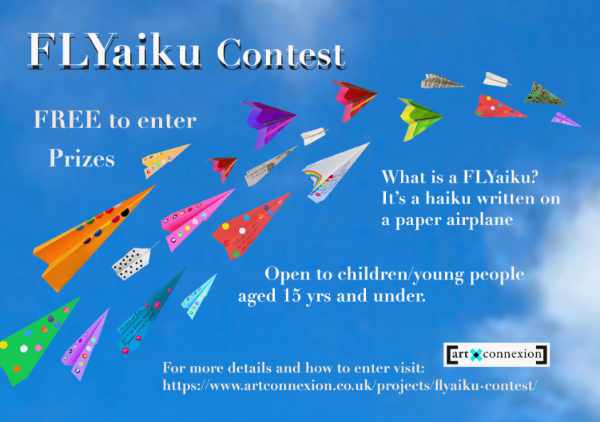
New primary school resources launched to support primary schools to tackle sexism.
The resources include classroom activities for all year groups to challenge gender stereotypes and promote equality in an age-appropriate way.
All resources are available to download on our online resource hub for teachers, where you can also find a variety of other tools and classroom activities to support primary colleagues to tackle sexism in school.
UK Feminista's new free resources for primary schools include:
- A classroom activity for ages 3-5
- A classroom activity for ages 5-7
- A classroom activity for ages 7-9
- A classroom activity for ages 9-11
- Guidance for primary school governors
Back to School with the Beano!
Beano for Schools has got what you need to make sure your classroom is buzzing with excitement, and it all starts with our school lesson programmes across English, Scottish, Welsh and Northern Irish curricula.
Why not add these following lessons to your calendar for the next school year:
- Reading Rocks: Transform reading time into fun! Created with Plazoom, have a laugh reading printable Beano comic stories and engage your class with comic comprehensions that make reading fun and interactive.
- Money and Me: In collaboration with Bank of England and TES, these 12 step-by-step lessons brings Dennis, Minnie and friends into your classroom to teach financial literacy in a way that's both informative and entertaining for kids.
- Bouncebackability: Join Dennis, Minnie and friends to help equip your pupils with the superpower of resilience by introducing and discussing mental health wellbeing in the classroom
SPaG LOLz: Write jokes, learn SPaG! These lesson plans will your class unleash their everyday rebel to create belly laughs and investigate ways to create their own jokes. - Save Our Food: Created with Ocado and WRAP, these fun Beano lessons will teach your class about the world's food waste problem and equip them to reduce their own food waste.
All lessons are free to download here and can be used across KS1 and KS2 stages. Make learning in the classroom fun as the new school year begins with Beano for Schools!
Sleep Action – sleep resources for primary and secondary
Good sleep hygiene and calming bedtime routines are critical to sleeping well. Use our resources to help your students better understand sleep and what they can do to get better night’s rest.
INSET: Activities & Training Resources from Dr Pooky Knightsmith
A super bank of ideas and resources on a range of topics ready to use. Including
- Bitesize CPD
- Activities to Generate Discussion and Action
- 6 in 60 Seconds
#Take10ToRead Campaign
#Take10ToRead is our campaign to increase reading for pleasure by promoting the mental wellbeing benefits of reading. It takes place on 10th October, World Mental Health Day.
Reading is a great way to relax, boost your mood and escape the pressures of daily life.
That’s why we’re encouraging everyone to take 10 minutes to read at 10am on Thursday 10th October to feel the wellbeing benefits of reading.
Register now to gain access to our partner campaign website which includes:
- Advice and tips on how to mark Take 10 in your organisation, e.g. through organising a virtual reading moment or encouraging staff to share book recommendations
- Graphics and copy to share on your social media channels and to employees through staff newsletters
- More info on Take 10, the benefits of reading for pleasure and ideas for creating a reading culture in your organisation.
The added difference you will make:
We know that children are more likely to enjoy reading if they see adults they care about reading too. This matters, because children who regularly read for pleasure do better at school and are happier. Research has also shown that reading for pleasure is more important for children’s cognitive development between ages 10 and 16 than their parents’ level of education, so it’s a critical factor in social mobility.
So, encouraging your workforce to #Take10ToRead will not only yield positive mental health benefits for your employees but will also have a knock-on effect on the reading enjoyment of the children in their lives, which will in turn improve the next generation’s life chances.
Headstart offers training, CPD, resources, conferences, projects and events. Below are details of some our current offers including activity guides and webinars by Dr Karen Treisman. Some resources are limited so please book early.
Belonging – an antidote to trauma, Dr Lisa Cherry – What is this event about?
The need to belong is a fundamental and human motivation – a sense of fitting in or feeling like you are important in the context of something bigger, such as a family, a setting, a community is part of our internal drive. In Lisa's research, 'movement' was a theme that consistently showed up across all the participants across home, education setting and community. Where movement is unavoidable, such as for those children known to the social care system, unaccompanied asylum seekers, refugees for example, then cultivating belonging is essential. The adults that those children become will invariably consider their relationship to belonging across the life course. This event offers the attendee an original conceptual model and insight into cultivating belonging as an antidote to trauma. It raises the importance that all those working with children and young people have in considering the adult that the child will become embedding practices that make the difference to those children and young people who rely on relationships, settings and communities.
In this session you will:
- understand how 'unbelonging' has been baked into systems, services and settings.
- deepen your understanding of the impact of trauma, inequity and marginalisation in services/education that further add to harm.
- be provided with a working conceptual model for culture change, for cultivating belonging and for making a difference to children and young people.
Presley the Pug activity guide and webinar
Like all dogs, Presley the Pug loves to play, run, and snuggle up under his warm blanket. But sometimes, Presley gets so excited that his feelings take over. Sometimes it’s anger, sometimes stress, sometimes worry. He doesn’t know how to calm down! What can Presley do when he feels like this? Luckily Presley’s canine friends are nearby with some wise words, and they share some of the tricks that have worked for them! This therapeutic activity book was developed by expert child psychologist Dr Karen Treisman. It features a colourful therapeutic story designed to help start conversations about coping with big feelings and how to find calm. It explains how Presley (and the reader!) is able to create a ‘mind retreat’ – an imaginary safe space where he can relax. The activity book is also packed with creative activities and photocopiable worksheets to help children to explore the ideas raised in the story, including regulating and coping tools like sensory boxes, relaxation exercises and easy yoga poses. It also features advice and practical strategies for parents, carers and professionals supporting children aged 5-10. See a video of Karen talking about Presley the Pug here.
Gilly the Giraffe webinar
Even though Gilly the Giraffe has many wonderful things in her life, she sometimes lacks confidence. Why does she have to stand out so much with her long neck, her long black tongue and her mosaic patches? Why do some of the other animals point and laugh at her? Can it be possible to be different and to be cool? This activity book developed by child psychologist Dr Karen Treisman combines a colourfully illustrated therapeutic story about Gilly the Giraffe to help start conversations, which is followed by a wealth of creative activities for children to explore and build upon some of the ideas raised in the story, and beyond! The activities are accompanied by extensive advice and practical strategies for parents, carers and professionals on how to help children aged 5-10 boost their self-esteem, self-belief, and confidence. Watch a video of Karen talking about Gilly here.
Trauma-informed thinking space module with Dr Mandy Davis and Dr Karen Treisman
A real, unscripted, unedited, & honest TI thinking space containing a series of reflective podcast style conversations about some of the thorny, nuanced, multi-layered aspects of TI practice in teams, systems, & organisations. Full of golden nuggets & enriching discussions. Here is a 17 min snippet to give you a flavour which is from the myths & dilemma’s section focusing on the question “Is Trauma Informed just about being sweet, nice, and kind?”
Supporting children and teens around bereavement, grief and death
An introduction on the impact of grief, loss, death and bereavement on children and teenagers; and underpinning ideas and creative, expressive, and practical strategies.
Arts Lab
Arts Lab is OPEN for applications from schools and community groups, and artists this week.

